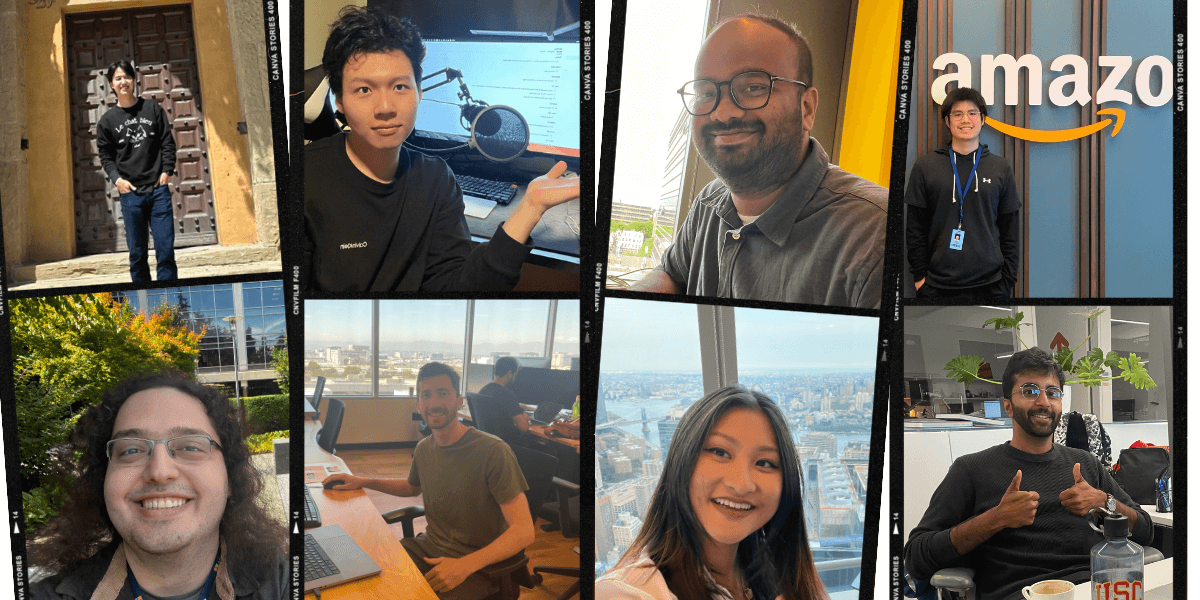Brian Alvarado
ISI Ph.D. students spent their summers gaining practical experience and building professional networks at major tech companies.

FROM LEFT TO RIGHT, TOP TO BOTTOM: JUSTIN CHO, JIARUI ZHANG, ASHWIN SHREYAS MOHAN RAO, PITHAYUTH CHARNSETHIKUL, KIAN AHRABIAN, ELAN MARKOWITZ, JULIE JIANG, TEJAS SRINIVASAN
Amazon, Microsoft, and Spotify – These are the few major companies that ISI Ph.D. students had the opportunity to intern over the summer allowing them to promote their research expertise to innovative projects that shape the world.
Both Justin Cho and Jiarui Zhang spent their time interning at Amazon AI – where they both worked on advancing language models to enhance the capabilities of voice assistants. By now, most people are familiar with Alexa – the famous voice assistant that enables others to interact through voice commands. Alexa can perform tasks ranging from playing the best hit of the summer to finding you a recipe for spaghetti carbonara. Yet, there are still challenges that require interns to showcase their research expertise. Cho was presented with the challenge of navigability. Since users may not have as much ability to interact with voice commands as text, they needed to adapt these large language models to translate their strengths into voice assistants such as Siri and Alexa. Zhang’s focus was more on the personalized service side, such as email paraphrasing. Her biggest takeaway was having first-hand experience of how major industries conduct research. She believes that this knowledge is invaluable and has undoubtedly shaped her future career choice.
Amazon’s success can also be attributed to its advanced supply chain management practices. Pithayuth Charnsethikul had the opportunity to work in the Inventory, Planning, and Control (IPC) department where he investigated the relationship between customer behavior and basket abandonment as part of the selection process. This information is useful for Amazon to enhance their online shopping experience, and ultimately increase their sales in the long run. Trust is also an essential component considering that voice assistants interact with all sorts of personal information. Elan Markowitz learned to balance detail and simplicity to get language models to follow subtle instructions.
Other students were immersed in a culture of innovation at Microsoft. Kian Ahrabian and Meryem M’Hamdi both spent their time improving foundation models and optimizing methods to improve the Bing search engine. M’Hamdi added, “Microsoft’s culture is about a growth mindset and about adopting an open-ended perspective to learning and it is empowering people to embrace every learning experience to grow each day.”
On the spectrum of technology, Pei Zhou interned at Google working with large language models in both corporate and educational settings, giving a more diverse perspective on how these models are used in different contexts. Similarly, Zihao We worked at TikTok to improve the model between both music and language learning. In a society that thrives on creative expression, this model helps users connect music and language to create better interactions between these two forms of expression. Music is more than just lyrical expression, it has the potential to reach a global audience and help those emerging artists wanting to showcase their work. Julie Jiang spent her summer at Spotify as a research scientist intern to understand the streaming consumption of new music releases.
Natural language processing models such as ChatGPT are trained to solve problems purely in text form. However, Tejas Srinivasan spent his summer at the Allen Institute for Artificial Intelligence (AI2) working on expanding their capabilities beyond text – “Working at AI2 has also been a great opportunity to talk to and learn from some of the best NLP researchers in the world, as well as build friendships and explore Seattle with other Ph.D. students from across the country.”
The beauty of interning abroad allowed other students to also build a global network and learn new insights into other international business practices. Wei-cheng Wu traveled to the National University of Singapore to research malicious software – a type of software designed to harm computer devices. Ashwin Shreyas Mohan Rao spent time at the University of Amsterdam’s School of Communication Research understanding and reducing the biased suggestions in YouTube’s recommendation. Rao added, “A recent audit conducted on YouTube showed that YouTube recommends more and more radical content as users continue down the recommendation chain. I am exploring reinforcement learning techniques to build an agent that counters this bias.”
While other students took their skills away from ISI, Arman Babakhani stayed locally interning at ISI researching classical algorithms for quantum simulations. He was presented with the challenge of writing a code to simplify quantum systems. This is important as it allows researchers to better predict behaviors and solve problems in the technological world.
ISI is home to cutting-edge research from artificial intelligence to information technology. These are the milestones that the Ph.D. students have worked endlessly to address complex issues in our technological world. Certainly, the future of technology is bright.
Source: USC Viterbi
Original content:
https://viterbischool.usc.edu/news/2023/08/isi-ph-d-students-connect-academic-learning-with-summer-internships/